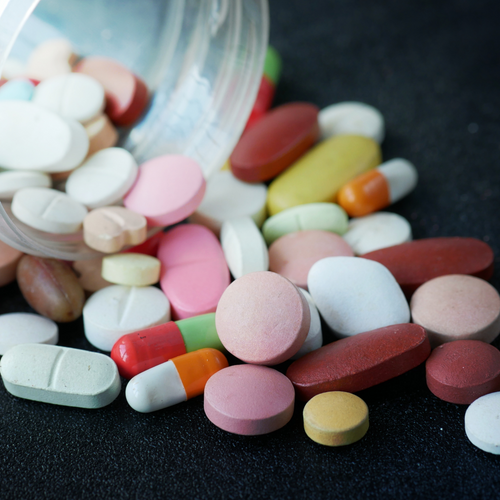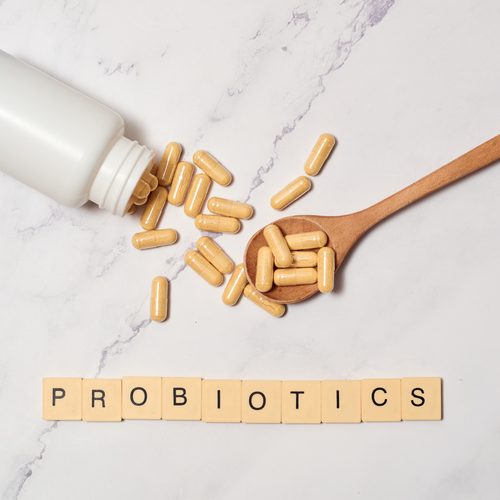What to remember:
- Different types of stomach pain can occur during physical exertion.
- Physical activity, regardless of its intensity, creates a particular physiological situation for our body, which has repercussions on the proper functioning of our digestive system.
- Improper diet and stress are examples of causes that can lead to stomach pain during physical exertion.
- Establishing a diet adapted to your sporting practice is necessary to prevent the occurrence of stomach pains during and after exercise.
- Taking care of your microbiota and intestinal mucosa is essential for digestive comfort during exercise.
Whether you're a top athlete or a weekend warrior, chances are you've experienced stomach pain after your workout. Don't worry, you're not alone. It's generally accepted that physical activity is essential for maintaining our physical and mental health. But what people don't necessarily realize is that it can sometimes lead to unwanted side effects, such as stomach pain, when approached in an unoptimal manner.
Types of stomach pain and their causes
When you exercise, different types of stomach pain can occur. Understanding these pains and their causes will help you better manage your comfort during and after exercise, which will help you perform better. Here is a non-exhaustive list:
1 - Gas and bloating
Gas and bloating are common problems during exercise and can be caused by several factors. During exercise, body movements can cause agitation in the intestines, releasing accumulated gas. Additionally, rapid and shallow breathing during exercise can lead to excessive air ingestion, increasing the presence of gas in the stomach. Trapped gas can cause pain, bloating, and a feeling of abdominal distension. To minimize these discomforts, prioritize a balanced diet and adjust your diet before exercise.
2 - Transit disorders associated with sport
Bowel problems, such as diarrhea, are often linked to exercise. Diarrhea can result from reduced blood flow to the intestines during exercise, disrupting digestion and bowel movements .
3 - Heartburn and acid reflux
Heartburn and acid reflux are, respectively, a sour feeling in the stomach (just below the chest) after eating, and a burning sensation that can extend from the stomach to the throat or even the mouth. Physical exertion can stimulate the production of stomach acid, which can lead to heartburn and acid reflux. In addition, the inclined or bent position in certain sports or intense movements can promote gastric reflux , where stomach contents rise up into the esophagus. This can cause discomfort, burning, and tingling sensations in the chest and throat.
Causes of stomach pain during and after exercise
During periods of rest, our digestive system focuses on its main task: digesting food , to extract the nutrients necessary for the proper functioning of our body. However, physical activity, regardless of its intensity, creates a particular physiological situation for our body, which has repercussions on the proper functioning of our digestive system. This is why it is not uncommon to experience stomach pain after physical exertion. Let's take a look at a non-exhaustive list of the different causes that can contribute to stomach pain during and after exercise.
1 - An unsuitable diet around physical effort
Did you know that when you're preparing to exercise, what you eat and when you eat it can have a significant impact on your digestive comfort during and after exercise? In fact, an inadequate diet before exercise is one of the main causes of stomach pain during and after exercise. First, consuming high-fiber foods (whole grains, legumes, vegetables, etc.) and cooked fats close to your workouts can lead to slow and incomplete digestion, which can cause digestive discomfort. Spicy or acidic foods can also irritate the gastric mucosa, which contributes to stomach pain. Furthermore, leaving insufficient time between your last meal and exercise can increase the risk of digestive problems due to incomplete digestion. Therefore, it's important to choose meals that are appropriate for physical exercise.
2 - Reduction of blood supply to the stomach during exercise
Physical exertion has a strong influence on the blood supply throughout our body. When the body is at rest, blood is distributed to all organs, with priority given to those needed for digestion. However, during physical exertion, the body will readjust this blood distribution to meet the needs of active muscles and provide them with the oxygen necessary for their proper functioning. Part of the blood that would normally be directed to your digestive system, including the stomach, is redirected to the muscles being worked. This physiological phenomenon is called “ intestinal ischemia-reperfusion .” It can cause digestive problems, lead to feelings of heaviness, and cause stomach pain during and after physical exertion. Indeed, this reduction in blood flow to the intestines leads to a slowing of the normal movements of the stomach and intestines, which prevents optimal digestion and causes bloating, stomach pain, and feelings of discomfort.
3 - Mechanical stress and rebound
During physical exertion, such as running, the body undergoes mechanical stress. The repetitive movements associated with exercise can cause internal jolts in the digestive system, which can disrupt digestion. This can lead to stomach pain, cramps , or a general feeling of discomfort in the abdominal area during and after exercise. If your stomach contains food that is being digested, sudden movements can aggravate these symptoms.
4 - Dehydration during exercise
During exercise, the body loses water through sweat to maintain its temperature. If you don't compensate for this loss by drinking enough, it can slow down your digestion and intestinal transit, which can cause bloating, digestive discomfort, and stomach pain. In addition, dehydration increases the ischemia-reperfusion phenomenon discussed above, and therefore digestive problems. To avoid this, it is essential to stay well hydrated by drinking water regularly throughout the day and adjusting your intake during exercise to account for what is lost through sweat. However, be sure to pay attention to how you hydrate during exercise. Indeed, taking in too much liquid or the type of drink you choose can lead to risks of discomfort due to stomach distension, vomiting, accelerated transit, or even diarrhea.
5 - Stress and anxiety
Stress and anxiety have a significant impact on the digestive system, contributing to stomach pain during and after exercise. When you're stressed or anxious, your body releases hormones, like cortisol, that disrupt digestion. Additionally, with the proven gut-brain connection , emotions like stress directly impact our gut by increasing its sensitivity and causing stomach pain. Our body also copes with stress by diverting blood to the muscles in a "fight or flight" response, which further disrupts the digestive system and worsens stomach pain.
6 - Pre-existing digestive problems
Stomach pain during and after exercise can be exacerbated in individuals with pre-existing digestive problems such as irritable bowel syndrome or Crohn's disease. Exercise-induced muscle contractions can trigger pain and spasms, especially for those sensitive to movement. The inflammatory state associated with these disorders can also be exacerbated by exercise, causing gastrointestinal symptoms.
Physical exertion and intestinal hyperpermeability
Did you know that physical exertion can lead to increased intestinal hyperpermeability? Intestinal hyperpermeability , also known as intestinal porosity, is a condition where the protective barrier of our intestine becomes more permeable than normal. The intestine then becomes a veritable "sieve". We previously mentioned that, during physical exertion, blood redistribution takes place to the benefit of the muscles and to the detriment of the digestive system. When the effort stops, functioning returns to normal and there is a phenomenon of reperfusion of the organs. However, this significant influx of blood is responsible for a high oxygen supply, which creates oxidative stress at the intestinal level and weakens the intestinal wall. This explains why physical exertion can compromise the integrity of the intestinal barrier and lead to intestinal porosity . This is all the more pronounced when dehydration due to exertion is significant.
Our tips for preventing and managing stomach pain during and after exercise
1 - A suitable diet before and during exercise
By adjusting your food choices and schedule, you can significantly reduce the risk of stomach pain during and after your workouts. Here are our tips to help you before and during exercise:
Nutrition before exercise
Before exercising, limit risky foods (high in fiber, fatty, spicy, etc.) and favor the consumption of soft, ripe, or even cooked fruits and vegetables to facilitate their digestion. Before exercising, opt instead for foods rich in simple, easy-to-digest carbohydrates. Carbohydrates provide a quick source of energy, ideal for supporting your physical activities. Fruits and light energy bars are excellent options. If you eat before exercising, make sure you leave at least an hour for your stomach to digest properly and pay attention to how you feel.
Generally speaking, during physical exertion, choose a diet that provides a quick source of energy without causing digestive discomfort. Here are some examples:
- Energy gels containing simple carbohydrates
- Balanced energy bars
- Sports drinks providing electrolytes and carbohydrates
- Dried fruits for natural sugars
-
Fruit pastes
Also, make sure you're drinking enough water regularly to maintain hydration. But be careful not to drink too quickly! It's recommended to drink around 500 ml/h, or 1 to 2 sips (100-150 ml) every 7 to 10 minutes, to give you an idea. Whether it's for hydration or nutrition, don't hesitate to seek the advice of a healthcare professional if you feel the need.
2 - Sufficient and regular hydration
In addition to monitoring your diet, we have seen that hydration is also crucial to prevent stomach pain that can occur during or after physical exertion. Drinking enough water before exercise keeps your body well hydrated, aids digestion , and prevents feelings of heaviness. However, avoid drinking large amounts just before exercise, as this can cause abdominal discomfort or even vomiting. During exercise, it is advisable to drink the same amount of water as you lose through sweat. Therefore, you can weigh yourself before and after exercise to see how much water you have lost (don't forget to subtract the water you drank during exercise, if applicable) and you will have the amount you need to drink during exercise to avoid dehydration and prevent stomach pain.
3 - A healthy microbiota and intestinal wall
The gut microbiota , composed of billions of microorganisms, contributes to digestion, nutrient absorption, and immune system regulation. An imbalance in the microbiota can disrupt these functions, leading to inflammation and intestinal hypersensitivity, which can worsen stomach pain during exercise. Additionally, a healthy intestinal wall plays a critical role in good gut health. A damaged intestinal barrier can allow toxins and unwanted molecules to enter the bloodstream, causing inflammatory reactions and abdominal pain. Maintaining a balanced microbiota and a functional intestinal wall is essential to prevent stomach pain during and after exercise.
4 - A proper warm-up
A proper warm-up before exercise can help prepare your body for intense movements. Gentle, targeted stretching can also help loosen your muscles and reduce abdominal tension. After you're finished exercising, take some time to gently stretch to soothe stressed muscles.














